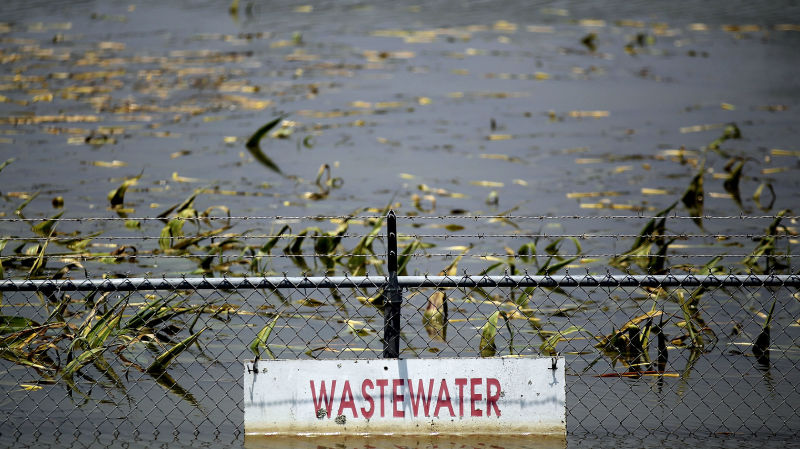
Hurricanes can be deadly. But they can unleash disgusting consequences as well. Among them? Shit. Literally. The flooding that accompanies these gigantic storms can unleash animal feces from industrial farms, and it can also trigger a release of our own crap traveling in pipes beneath our cities if the system clogs or breaks down from all the floodwater.
Advertisement
That’s always a public health threat, but the coronavirus pandemic adds another layer of risk because the virus appears to spread through not only spit and mucus but poop, too. Several studies have found evidence of SARS-CoV-2—the technical name for the particular coronavirus—in the gastrointestinal systems and feces of patients. In one case, the virus lived on in a patient’s poop 33 days after the patient’s respiratory samples tested negative. The science isn’t clear yet on whether another person can pass along the virus this way, but different strains of coronavirus have been transmissible through feces.
None of us want to think about our crap once it leaves our body, but it does not simply disappear after we flush. It makes its way through the pipes that make up sewage systems before reaching a wastewater treatment plant. There, plant operators pump this water full of oxygen and chemicals like chlorine to break down our shit and clear the water of any nasty chemicals before releasing it all back into local waterways.

These systems, however, are severely outdated. This was an issue long before the pandemic. Pipes need to be replaced, and capacity needs to be increased as populations grow. The American Society of Civil Engineers projects that addressing aging infrastructure will require a $195 billion investment through 2040.

How to Keep the Fun (And Work, Ugh) Going During a Power
Now, hurricane season could bring the risks to the forefront. Storms can overwhelm wastewater plants through heavy rain and storm surge. Winds can also knock out power. Any of these hazards can cause sewage to backup into streets or even infiltrate drinking water. When Hurricane Sandy struck the Northeast in 2012, 11 billion gallons of waste made its way onto streets and waterways across eight states. During Hurricane Irma in 2017, more than 28 million gallons of sewage spilled across Florida.
This hurricane is forecast to be worse than usual, and the health crisis will create challenges in evacuating, sheltering, and rebuilding. Coronavirus in poop only adds to the challenges should any storms make landfall.
Advertisement
“What we would like to point out is that covid-19 increases the public health consequences of these sewer overflows,” Timothy Whitehouse, executive director of watchdog group Public Employees for Environmental Responsibility (PEER), told Earther. “It’s something that EPA’s public health services need to be monitoring, needs to be testing, and needs to be very attuned to the potential risk posed to humans—not just by the overflow of sewage but also by the potential transmissibility of the illness.”
The Environmental Protection Agency has issued a statement noting that wastewater treatment plants treat viruses and pathogens, so current treatment methods are “expected to be effective” in killing the virus. PEER, whose staff includes former EPA scientists, wants to see the agency take this risk more seriously through increased monitoring of drinking water for signs of the virus and improving public infrastructure to prevent this from happening in the first place.
Advertisement
Workers at these plants are at increased risk of contracting the virus, too. The personal protective equipment necessary for working safely during the pandemic—face masks, gowns, gloves—is running low everywhere. In a survey the American Water Works Association conducted in March, 59 percent of utilities surveyed reported they are experiencing a disruption accessing these materials or expecting to in the next month.
Independent scientists are also calling for more research on the coronavirus-poop link. Earlier strains of coronavirus in China have seen outbreaks likely as a result of sewage leaks. Researchers don’t want to see that happen, particularly in the middle of a hurricane or other disaster.
Advertisement
“This virus lives outside of the human body,” Whitehouse said. “It lives for a long time. It’s highly transmissible, and so vigilance needs to occur not just in human interactions but interactions with our environment around us.”
